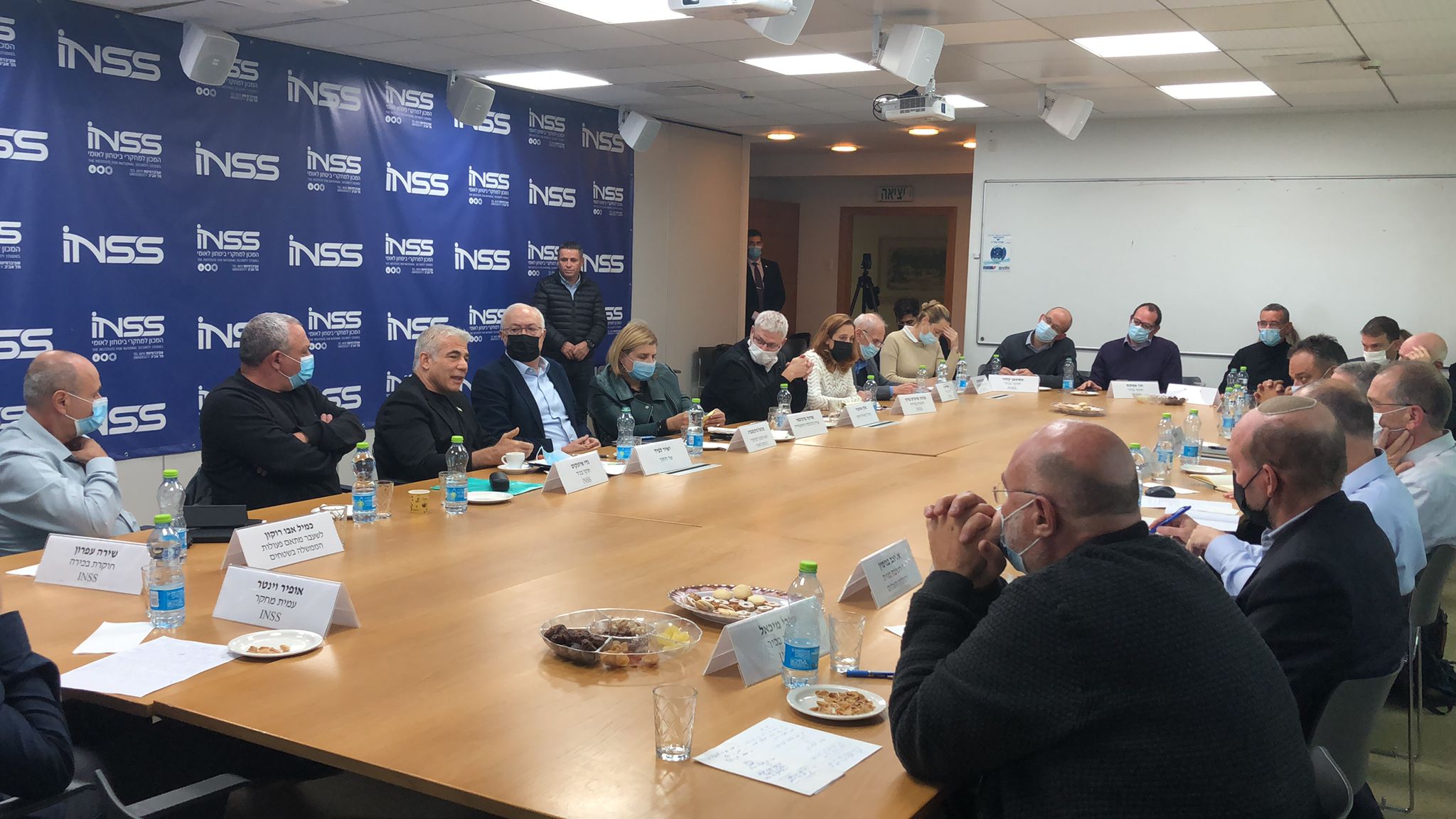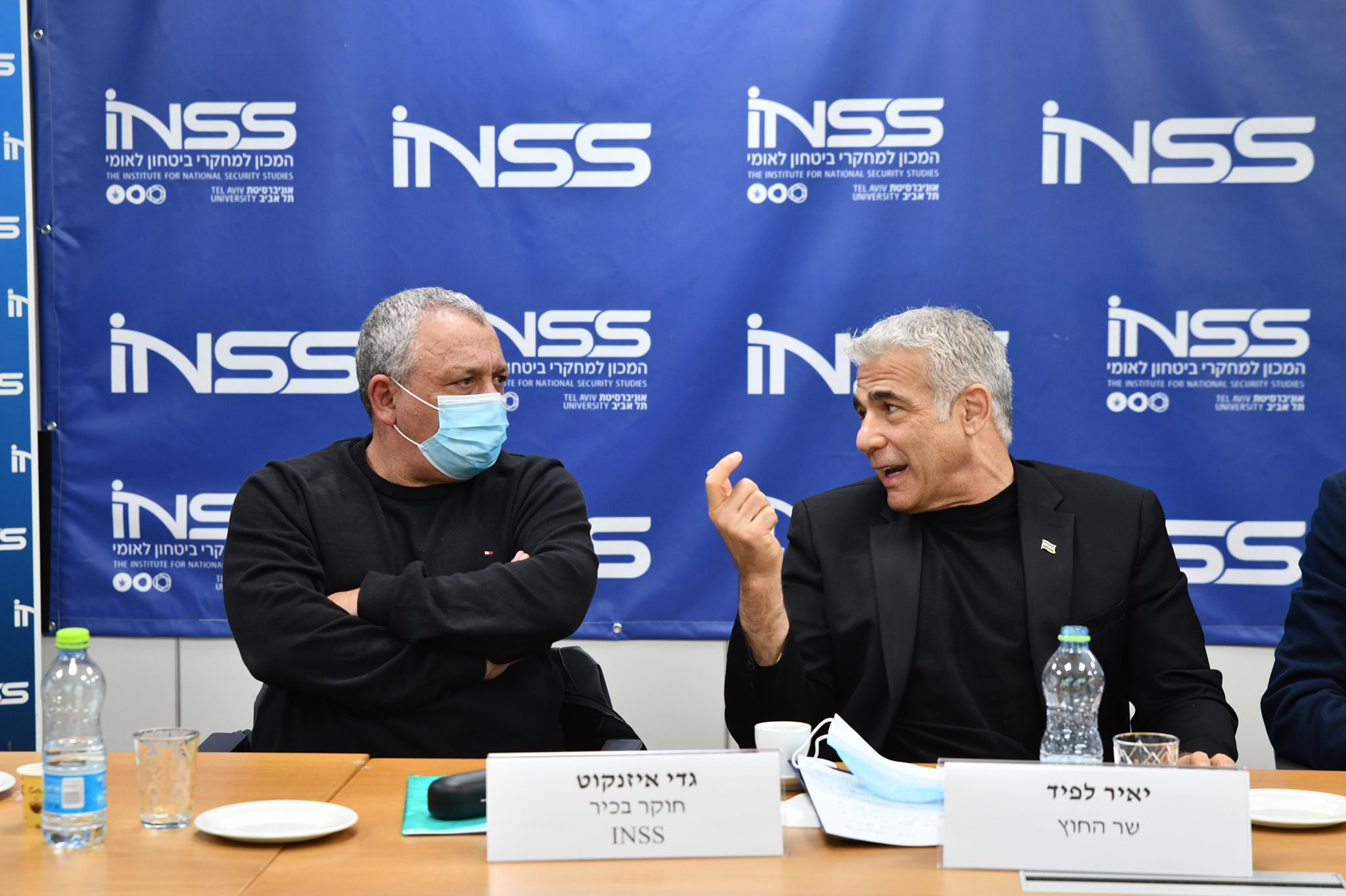Press Releases
Foreign Minister Lapid Holds a Roundtable Discussion at the Institute for National Security Studies (INSS)
December 27, 2021
On Thursday, December 23, 2021, Foreign Minister Yair Lapid held a roundtable discussion at the Institute for National Security Studies (INSS) at Tel Aviv University on his “Economy for Security” plan. INSS, a central platform for national bodies to discuss issues of strategic, military, political, and economic national security, was represented by the Executive Director of the Institute, Prof. Manual Trajtenberg; senior research fellow and former IDF Chief of Staff Lt. Gen. (ret.) Gadi Eisenkot, INSS Managing Director Brig. Gen. (res.) Udi Dekel, and selected researchers. Among the other participants were Minister of Economy Maj. Gen. (ret.) Orna Barbivai, Director General of the Foreign Ministry Alon Ushpiz, and additional figures from the Foreign Ministry.
In the course of the discussion, Foreign Minister Lapid presented the “Economy for Security” initiative, and said:
“The purpose of this move is to create security, civilian, economic, and political stability on both sides of the border. The international community and residents of Gaza have to know that Hamas terror is a barrier between them and normal life. In recent months I have talked to many people, from Egypt to the United States and the European Union, and they all believe there is no other way.
“The guiding principle is the creation of an ongoing, multi-phase, and gradual process of reconstruction in the Gaza Strip, to ensure proper peaceful management of the Strip as long as the process continues. Correct long term management of the process will allow Gazans, Egypt, and the international community to serve as leverage vis-à-vis Hamas, to prevent the organization’s force buildup and terrorist activity.”

The INSS researchers discussed the Foreign Minister’s plan and presented the conditions for its success, as follows:
- A halt to Hamas force buildup, together with the organization’s demonstrated commitment to long-term calm.
- Deep international and regional commitment – raising donations, seeking investments, and setting up an effective international task force mechanism to manage the reconstruction and ensure that resources are not diverted to Hamas’s military needs or to other terror organizations in the Strip.
- Support for the Palestinian Authority, reinforcing its control of its territory in the West Bank, while proposing a broader political framework – these are essential conditions for the integration of the PA into the Gaza reconstruction process.
- Creation of potential for internal growth in the Gaza economy.
- Egyptian willingness to participate in the project as a leading, central element benefiting from the economic and political gains, and serving as a platform for the recruitment of other Arab states to the project, particularly the Gulf states.
- Preventing Hamas from receiving international recognition that would undermine the status of the Palestinian Authority.
- Failure of the project would not worsen the current security and humanitarian situation.

In the discussion, former Chief of Staff Lt. Gen. (ret.) Gadi Eisenkot said that “Israel must take the Cairo statement issued at the end of Operation Protective Edge out of the attic, and work on the solution with Egypt as a full partner, and not simply a broker.
“Given the understanding that after the disengagement, where there are no settlements in Gaza, any arrangement will have broad public support, I propose that we add another layer, namely, strengthening the Palestinian Authority and the economic situation in the West Bank and not Gaza, although Israel’s room for flexibility exists primarily in the Gaza Strip, mainly for internal considerations.
“Strengthening Hamas and weakening the PA, deepening the processes of despair, and advancing the one-state vision – this situation hurts Israel’s national interests. Therefore moves of this kind can be promoted primarily after a significant military operation.
“Our interest is clear – to promote an interim arrangement, based on the understanding that there is no place for a broader move because an end to the conflict or a permanent settlement is not feasible at present. The move must be inclusive, involving the Palestinians and Gaza, plus Egypt, the Gulf States, and the international community.
“The Egyptians are not a broker but a partner; they want a deal and a full solution; they want American recognition and money, investment, and water. They are not a broker to whom we must make a pilgrimage, but a party to be involved in any arrangement between Israel and the PA with Gaza and Egypt. The new reality that emerged a week ago with the completion of the underground and above-ground barrier allows Israel to undertake active economic processes by creating an industrial zone and hospitals, with a demand for Egypt to build a port on the Strip with a corridor of 600 meters from the Philadelphi Route, since they are a partner with concomitant responsibility.
“But that can only happen after an agreement on the return of the prisoners and the missing, and the key is implementation of growing security responsibility.”
Executive Director of INSS Prof. Manuel Trajtenberg summed up as follows:
“The Institute of National Security Studies (INSS) is always ready to collaborate with decision makers, and engage in an in-depth examination of the main issues affecting Israel’s security.
“Thus, at the request of Foreign Minister Yair Lapid, today we held a broad professional discussion about the various options for Israeli strategy vis-à-vis Gaza, and in particular about the Foreign Minister’s initiative to launch the ‘Economy for Security’ program. Any initiative in this context involves considerable risks, since the aggressive nature of Hamas will not change. At the same time, it is important to try and promote such initiatives, because there is a chance that the situation on the ground could improve, and this would bolster Israel’s standing internationally.
“In addition, when we think about Gaza, it is important to separate the Gaza population from Hamas: for Gazans, the issue is primarily humanitarian, but also pragmatic – the better their economic situation and lives in general, the more they will have to lose from recurring conflicts with Israel. As for Hamas, the big difficulty of course is how to stop their military buildup, and how to maintain the relevance of the PA.
“There are no magic solutions, but a passive policy of reaction only will lead to another round of pointless fighting. Israel must lead these processes, and not be led.”
Foreign Ministry Director General Alon Ushpiz discussed international delegitimization and said:
“In recent months, the challenges of delegitimization in the international arena have increased, even to the use of strident expressions from the world of apartheid. The Foreign Ministry is conducting an ongoing and determined battle against this challenge, as we saw recently at the Durban Conference. The situation in Gaza, and the struggle for the security of Israel in general and of the Gaza envelope residents in particular, also touches on the question of legitimacy and the methods of the Hamas terror organization. The ‘Economy for Security’ plan is another important element in the efforts to reinforce our legitimacy.”


